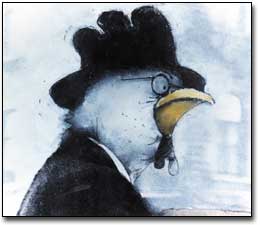Filmmaker/Lecturer Nominated for Oscar

If Wendy Tilbys name is called at Sunday nights Academy Awards presentation in Los Angeles, a roar of applause may be heard emanating from the Carpenter Center on Quincy Street. Tilby, a Visiting Lecturer who teaches two film animation courses in Visual and Environmental Studies (VES) at Harvard, has been nominated for best animated short film her second Oscar nomination for a 10-minute film entitled When the Day Breaks that she co-directed with Amanda Forbis, a friend from art school.
The film, produced by the National Film Board of Canada, features spirited animal characters and simple inanimate objects like toasters and lemons to evoke complex human emotions. It begins with a chance meeting outside a corner store. A pig bumps into a chicken, who spills his groceries onto the ground. Moments later, the story takes a tragic twist. Finding herself suddenly traumatized and distraught by the scene that has just played out before her, the pig is launched into a surreal mental journey through the citys infrastructure, in search of comfort and connection. “The city, which was, at the beginning, a very happy place, is now ominous and scary and dangerous,” Tilby says.

“The story evolved from a few different ideas,” Tilby explains. “At first I wanted to make a much more abstract film, to music, about the qualities which define a person the physical as well as metaphysical components but I was also thinking about notions of cause and effect in peoples lives, and the idea developed into something much more narrative.”
If the random and often haphazard nature of our existence is one theme of the film, our humanity is the other. As the pigs mind races “through her teakettle, and into the electrical system in the city,” the viewer sees flashes of other apartments, the sewer system, and a subway train filled with commuters. The sequence climaxes at the chickens breakfast table, just as he had left it that morning, with a close-up of a half-eaten piece of toast sitting alone on a plate. “In the end,” Tilby explains, “[the pig] finds the courage to go on and she emerges a sadder but wiser pig.”
Tilby says she and her co-director chose animals to represent the characters because they wanted the film “to have a lightness and humor that contrasts with what happens in the city.” She admits the idea “seemed far-fetched at first, but the more we thought about it, the more we liked it [The animals] were more empathetic figures Somehow you feel their innocence.” The viewer also feels their pain.
As unusual as the leading characters are, the process used to produce the film is even more novel. The filmmakers employed a relatively new cinematic technique, using video stills as the foundation for the animated images, which were then painted by hand, frame by frame. Physical characteristics were intensified, while backgrounds were faded. The result is a sort of animated cinema verité.
It was a labor of love for Tilby and Forbis, who took four years to complete the project. “We had some dark moments in the middle of it because we had no idea if people were going to get it or appreciate it,” Tilby reflects. “When you emerge after four years, you feel that life has gone by, but now its starting to feel worth it.”
Part of the satisfaction comes from critical acclaim. When the Day Breaks has won several major awards, including the Palme dOr in the Short Film category at the Cannes Film Festival, and the Grand Prix for Best Animated Short Film at the Annecy International Animated Film Festival in France. Winning the Oscar would be “gravy,” according to Tilby. “Its thrilling and gratifying [just to be nominated],” she says. “Even though [the Oscar] isnt necessarily the accolade that means the most [to animators] , it indicates that people must like the film, which is all that one can hope for.”
Tilby didnt start out to be an animator. Born in western Canada, she originally wanted to be a writer, but her interests broadened to include documentary filmmaking, which she pursued at the Emily Carr College of Art and Design in Vancouver. She quickly came to the realization that animation was the best of all worlds, because she could explore whatever subjects she wanted, while having “complete control” over the process. “[With animation] one can write with movement, music, and narrative,” she says. “Its pretty expressive.”
After art school, Tilby moved east, to Montreal, where, as a freelancer, she directed two films at the National Film Board of Canada while teaching at Concordia University. Her second film, Strings, was nominated for an Academy Award in 1992, but it didnt win. Tilby, who attended the ceremony, was not terribly disappointed. “I remember feeling relieved,” she says. “The thought of getting on stage [to accept the award] was utterly terrifying.”
It appears Tilby is a little more confident with her success this year. Although she is a bit uncomfortable about competing against three of her friends who are also nominated (four of the five films nominated in the Animated Short category have ties with Canada; the fifth nominee is a British production), Tilby is hopeful that an Oscar will stave off threatened budget cuts at the Film Board. Her biggest challenge now, she says, is figuring out what to wear at Sunday nights Academy Awards ceremony. After all, her name may be called, and if so, she may have to acknowledge the cheers sweeping all the way from her adopted home of Harvard University.




